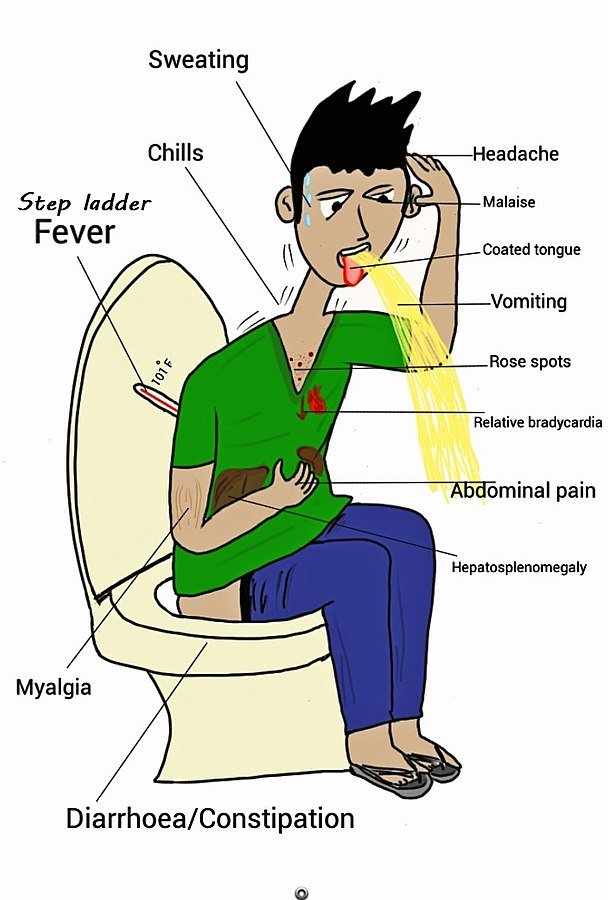Typhoid Fever- A Common Sickness in Africa.


Salmollena Typhi, Typhoid fever as so many of us know it, is common in developing countries, as a matter of fact, Typhoid happens to be one of the common sicknesses in such countries (mine not being an exception). Although some developing countries also experience this bacterial infection, the level of occurrence is lower than what we find in developing countries.
Exposure to contaminated water, and food can be a very good way to contact Typhoid, at the same time, exposure to an already infected person can be a factor as well.

The causative bacteria of Typhoid Fever.
Typhoid fever is caused by Salmonella, which is similar to the same bacteria that causes food poisoning, although this is different.

Ways in which Typhoid fever spreads.
Contrary to the popular opinion that typhoid is spread through water, there are other ways that the bacteria can spread, let’s find out about those other ways.
Through Food.
A person who is infected with Salmonella typhi will move around with that infection and if he or she uses the toilet without washing of hands, then proceeds to prepare a meal, the food prepared will also be contaminated and everyone who eats the food will become a carrier of the virus as well.
Similarly, if an infected person pees without washing of hands and proceeds to handle food, the food prepared will get contaminated making everyone who eats out of the food become a carrier of the virus.
Contamination of central water supply.
In a case where there is poor and improper sanitation, human waste carrying infection can contaminate the general water supply system. People who use water from that central system either through drinking or cooking, have a great tendency of developing typhoid fever.

Through the use of the toilet.
A toilet becomes infected after being used by a person who has Typhoid Fever, if the toilet is not properly sanitized and another person has contact with the toilet, then proceeds to touch the mouth before washing of hands, such person will also contact the bacteria.
Through the consumption of vegetables.
Some vegetables were fertilized with human waste (which may be infected human waste), consuming these vegetables without properly cleaning them will make the consumer get infected with the bacteria as well.

Symptoms of typhoid fever.
The early symptoms of fever can be greatly likened to the normal feeling of having fever or feeling sick and these fever symptoms will include:
- Fever
- Abdominal pain etc.
- high fever,
- Headache.
- Abdominal pain.
- Loss of appetite
- Body aches, bloody stools, fatigue, confusion, and hallucination, are other serious symptoms of typhoid fever.
How medical experts diagnose Typhoid fever.
Most cases of illnesses that occur in Nigeria are usually Malaria and Typhoid so when you feel ill and you explain these symptoms in a Nigerian hospital, you are immediately asked to take Malaria and Typhoid tests to ascertain the bacterial infection. In advanced counties like the United States, for example, doctors may not think of Typhoid as a problem first hand, except of course you mention that you have visited or you have been exposed to areas where the infection is paramount.
A test is carried out of course in order to ascertain the suspicion, a simple blood test or a stool test is carried out and confirmation is made when there is a confirmation of Salmonella typhi in the test sample.

How can typhoid fever be treated.
• There are vaccinations against typhoid fever (might not be available in every region), getting vaccinated will definitely keep you from getting the bacteria that causes typhoid.
• Drinking just bottled water or properly refined water.
• Avoid the consumption of undercooked or raw food.
• Thorough hand washing before cooking or eating anything remains very important.
• Try your best not to eat food from street vendors.
• Any fruit or vegetable that cannot be peeled and are sold in exposed places needs to be avoided.

Ways in which typhoid fever can be treated.
Since typhoid is a bacterial infection, it is treated with Antibiotics, which will destroy the bacteria causing the infection. Some of the common antibiotics used to treat this bacteria causing the infection are; Chloramphenicol, ampicillin, cotrimoxazole, cephalosporins, fluoroquinolones amongst many others which will be decided by the doctor based on the latest treatment option available as well as the level of typhoid in the body.

Helpful tips to help prevent the spread of Salmonella typhi.
• Ensure the continuation of the given antibiotics for as long as the doctor instructs, resist the urge to stop the intake of your medication because you feel better.
• Always wash your hands with water and soap after using the toilet (water alone is not a good option).
• Be careful with having contact with food especially food that will be consumed by other people aside from you.

Do you know?
Do you know that you can still be a carrier of Salmonella typhi even after taking certain treatment? So while you may feel better after taking treatment, there is a great probability that you will infect others with the bacteria if you fail to properly wash your hands before cooking or handling a consumable material after using the toilet.
Do you know that the attempt to treat typhoid by yourself, could turn out very deadly? This is because the level of bacteria in your body might be really high and may demand some fluid or injection treatment.
Do you know that typhoid fever left untreated in the body, could result in serious complications like kidney failure or even intestinal hemorrhage?

References.
https://my.clevelandclinic.org/health/diseases/17730-typhoid-fever
https://www.medicalnewstoday.com/articles/156859#prevention
https://www.cdc.gov/typhoid-fever/symptoms.html
https://my.clevelandclinic.org/health/diseases/17730-typhoid-fever
https://www.nhs.uk/conditions/typhoid-fever/causes/
Image Credit


Hi, I am Tobi a writer, a speaker, relationship counselor, lover of good music. I love making friends and learning from people, I sincerely appreciate every love I get from members of the community, do well to keep them coming.